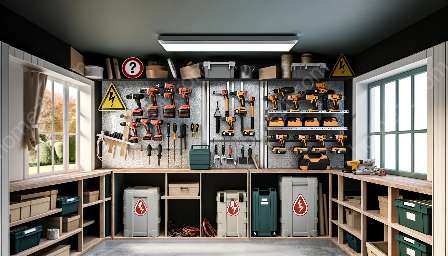Electrical tools are an essential part of many home maintenance and improvement projects, and using them safely is crucial to prevent accidents and ensure home electrical safety and security. Proper storage and responsible handling of electrical tools can help avoid potential hazards and maintain a safe environment in your home. In this article, we will discuss the best practices for handling and storing electrical tools safely, ensuring home electrical safety, and contributing to overall home safety and security.
Importance of Safe Handling and Storage of Electrical Tools
Electricity is a powerful force that requires respect and caution when using electrical tools. Mishandling or improper storage of these tools can lead to electrical hazards, including electric shocks, fires, and other accidents. By understanding and implementing safe handling and storage practices, you can minimize the risks associated with electrical tools and contribute to a safer home environment.
Safe Handling of Electrical Tools
Proper handling of electrical tools is essential for preventing accidents and ensuring home electrical safety. Follow these guidelines to handle electrical tools safely:
- Inspect Tools Regularly: Before using any electrical tool, carefully inspect it for any visible damage, frayed cords, or exposed wires. Do not use damaged tools and have them repaired by a professional.
- Use Tools as Intended: Always use electrical tools for their intended purpose and avoid using them in ways not recommended by the manufacturer. Using tools incorrectly can lead to malfunction and potential hazards.
- Wear Protective Gear: When working with electrical tools, wear appropriate protective gear, including insulated gloves and safety goggles to protect yourself from potential electrical hazards.
- Avoid Wet Conditions: Never use electrical tools in wet or damp conditions. Moisture can conduct electricity and increase the risk of electric shocks.
- Unplug When Not in Use: Always unplug electrical tools when not in use, during maintenance, or when changing accessories. This prevents accidental starts and reduces the risk of electrical shock or fire.
Proper Storage of Electrical Tools
Storing electrical tools safely is essential for maintaining their functionality and prolonging their lifespan while ensuring home electrical safety. Here are some tips for proper storage of electrical tools:
- Organize and Label: Keep your electrical tools well-organized and labeled in a designated storage area. This makes it easier to find the right tool when needed and reduces the risk of mishandling or damage.
- Use Cases or Toolboxes: Store electrical tools in durable cases or toolboxes designed for electrical equipment. These containers provide protection from dust, moisture, and physical damage.
- Wrap Cords Properly: When storing power tools with cords, neatly coil and secure the cords to prevent tangles and damage. Avoid wrapping cords tightly around the tool to prevent kinks or damage to the wires.
- Avoid Extreme Temperatures: Store electrical tools in a cool, dry place away from direct sunlight and extreme temperatures. Exposure to heat or cold can affect the performance and lifespan of the tools.
- Regular Maintenance: Perform regular maintenance on electrical tools to ensure they remain in good working condition. Clean tools after use, inspect cords for damage, and lubricate moving parts as necessary.
Conclusion
Handling and storing electrical tools safely is crucial for maintaining home electrical safety and security. By following the best practices outlined in this article, you can minimize the risks associated with electrical tools and create a safer environment in your home. Remember to always prioritize safety when working with electricity and use electrical tools responsibly to prevent accidents and ensure the well-being of your household.



















